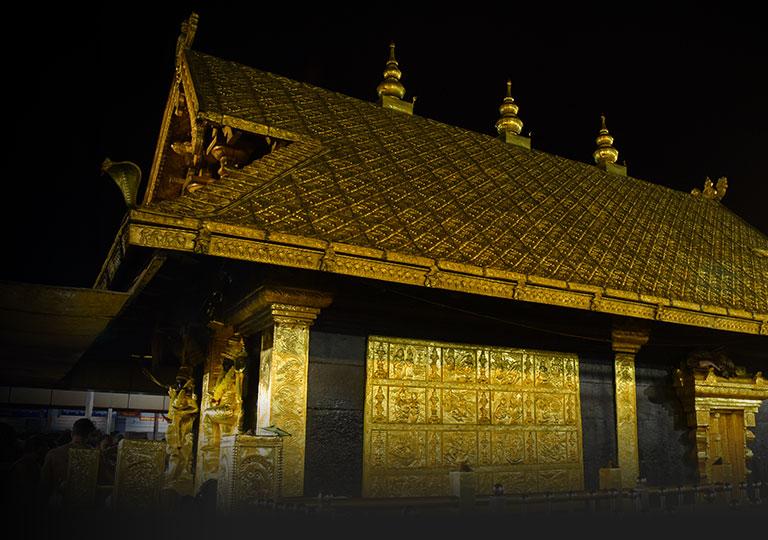Published Nov 22, 2025 | 9:00 AM ⚊ Updated Nov 22, 2025 | 9:00 AM

Gold-plated sanctum sanctorum of Sabarimala.
Synopsis: Senior CPI(M) leader and former Devaswom Minister Kadakampally Surendran’s alleged links with Unnikrishnan Potty, the prime accused in the Sabarimala gold theft case, have intensified pressure on the ruling party. This comes after former TDB president A Padmakumar, who was arrested on 20 November, is said to have claimed that the proposal for the gold plating was sent directly to the government with ministerial assent, rather than to the Board.
With only weeks left for the local body polls in Kerala, the slow-burning Sabarimala gold theft case is now threatening to engulf the ruling CPI(M).
Senior party leader and former Devaswom Minister Kadakampally Surendran has found himself at the centre of the controversy after A Padmakumar, a former Travancore Devaswom Board president and a close party aide, was arrested as the sixth accused by the special investigation team probing the case on 20 November.
According to sources, Padmakumar claimed that Unnikrishnan Potty, the prime accused and the sponsor behind the gold plating of the sanctum sanctorum and the Dwarapalaka sculptures, had initially submitted his proposal to the government and not directly to the Devaswom Board.
The file was forwarded to the Board on the basis of government instructions, allegedly with ministerial consent.
Padmakumar reportedly admitted meeting Potty multiple times at Aranmula and at the Board headquarters, and forwarding the application while citing ministerial approval.
Investigators now consider questioning Kadakampally Surendran essential to determine whether government involvement influenced what was meant to be an independent Board decision.
SIT officials say these revelations, along with records and officer statements seized from the Board office, were crucial in securing Padmakumar’s arrest.
The remand report states that Padmakumar was the key figure behind the Sabarimala gold-plating scam. According to investigators, he initiated the plan in early 2019 and altered official records.
The report says Padmakumar personally changed Board minutes, mislabelled gold plates as copper, and facilitated the removal of the plates from Sabarimala. Officials have testified that he directed decisions in Potty’s favour.
Documents recovered from the Board office have now become critical evidence.
The SIT is also probing whether anyone higher up was involved and is trying to trace what happened to the original gold taken from the Sannidhanam, including whether it was sold.
Opposition leader VD Satheesan expressed concerns over the minister’s alleged connection with the prime-accused Potty.
“Unnikrishnan Potty was known to be close to Kadakampally Surendran. Even after the arrests, Kadakampally continued to praise N Vasu as an exemplary officer, reportedly out of fear that Vasu might testify against him. Despite these controversies, the Devaswom Board under PS Prashanth brought Potty back into the fold, allegedly with the consent of the current Devaswom Minister.
It took the High Court’s intervention to prevent further damage. There were even concerns that the gold idol of Lord Ayyappa could have been at risk.
The chief minister can no longer remain silent on the scale of this alleged looting. Kerala is now witnessing a situation where senior CPI(M) leaders are facing jail one after another,” Satheesan told South First.
He stressed that investigations must extend to Kadakampally Surendran, saying the High Court judgment validates many opposition claims.
Surendran has firmly denied any involvement in the gold plating scam.
“The Devaswom Boards function independently. There is no need for files to reach the ministerial level. During my tenure, no related file came to me. The Board’s decisions are its own, and the Devaswom Minister has no authority to interfere,” he said, speaking to the media.
He added that all five Devaswom Boards in Kerala operate autonomously. On the opposition’s allegations, he said, “A fair investigation is underway. There is no need to broadcast every matter to the media. The opposition selectively responds to Sabarimala-related issues while ignoring other complaints.”
Meanwhile, incumbent Devaswom Minister VN Vasavan stated that restrictions from the court and the Election Commission prevent him from commenting on any issue, particularly while addressing the media.
However, this explanation has drawn strong criticism, with many questioning how long he can continue to remain silent.
Political analyst S Nandagopan from Kochi observed that the timing of the arrests is particularly sensitive.
“With the Sabarimala pilgrimage underway and local elections approaching, the CPI(M) can no longer dismiss these allegations. With Padmakumar arrested, the party’s defensive strategy, minimising Vasu’s role as a local leader, is no longer tenable. The opposition alleges that not just officials, but even ministers, could be involved. CPI(M) now has to respond,” he told South First.
Nandagopan also pointed out that the High Court has recently begun taking a stronger stand on cases involving the government.
The court’s sharp remarks in the Cashew Development Corporation corruption case, which hinted at government complicity, came around the same time as Padmakumar’s arrest, further increasing political pressure on the LDF.
Just days ago, the High Court sharply criticised the state government for again refusing sanction for a CBI probe against former KSCDC chairman R Chandrasekharan and ex-MD PA Ratheesh in a cashew import corruption case worth nearly ₹600 crore.
Justice A Badharudeen, hearing a contempt plea, asked why a government claiming to uphold the rule of law was “protecting the corrupt,” warning that the court would be forced to record such an observation if the stance continued.
The CBI, which found major irregularities in imports between 2006 and 2015, sought permission to prosecute, but the government rejected the request, citing lack of new evidence. The case will be taken up again next week.
(Edited by Dese Gowda)

